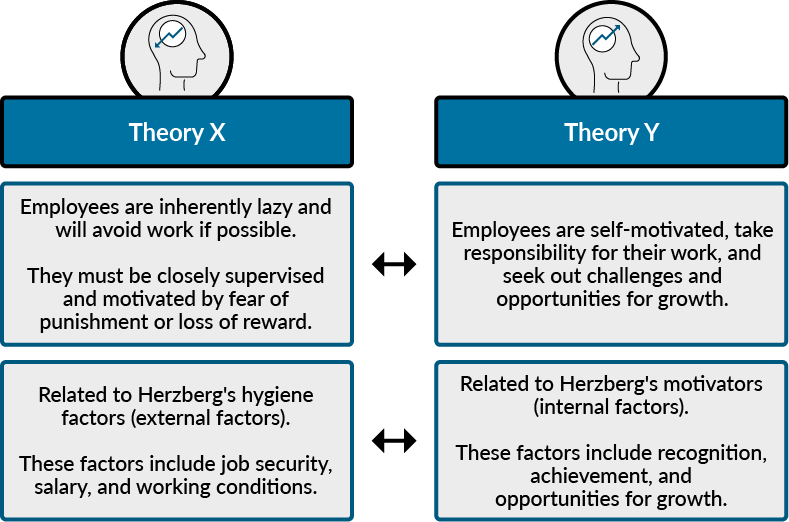Douglas McGregor – Theory X and Theory Y
We felt it is essential to address Douglas McGregor’s – Theory X and Theory Y as his theory is still relevant today. Many organizations and managers continue to hold assumptions and beliefs similar to those outlined in Theory X and Theory Y.

Theory X assumes that employees are inherently lazy and will avoid work if possible, so they must be closely supervised and motivated by fear of punishment or loss of reward. Theory Y assumes that employees are self-motivated, take responsibility for their work, and seek out challenges and opportunities for growth. Theory X can relate to Herzberg’s hygiene factors, which are external factors that can lead to dissatisfaction if unmet. These factors include job security, salary, and working conditions.
Theory Y, on the other hand, can be related to Herzberg’s motivators, internal factors that can lead to job satisfaction and motivation. These factors include recognition, achievement, and growth opportunities.
McGregor’s theories can also relate to Maslow’s hierarchy of needs, as Theory X assumes that employees are motivated by lower-level needs, such as physiological and safety. In contrast, Theory Y assumes that employees are motivated by higher-level needs such as esteem and self-actualization.
The following supplementary video may help you better understand the concepts provided. This supplementary resource has been authorized by the content creator. To view free and open supplementary resources, please click the link below
https://www.youtube.com/watch?v=S8LQ1VxZ9kU
[Mister Simplify]. (2020, June 18). McGregor XY Theory of Management – Simplest Explanation Ever [Video]. Youtube. https://www.youtube.com/watch?v=S8LQ1VxZ9kU
Bringing up McGregor’s theory can allow you to critically examine your beliefs and assumptions about employee motivation and consider alternative approaches to motivating employees. Additionally, McGregor’s theory can provide a useful framework for understanding different management styles and their potential impact on employee motivation and performance, such as autocratic versus democratic leadership.
Overall, understanding these theories can help managers create a work environment that fosters motivation and job satisfaction, leading to increased productivity and success for the business.